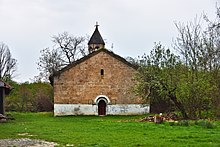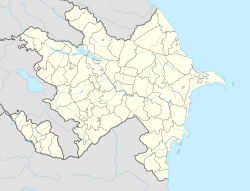St. Elisaeus Tsilin Church (Udi: Ĭvĕl Yeliseyi s'iyen S'ilin Gergeś) is a 19th-century church in Nij, Azerbaijan. Locals call it simply Tsilin Church to distinguish the church located in the lower (Armenian: Ներքին, romanized: nerkin, Udi: s'ilin, lit. 'lower') quarter of the village from the St. Mary the Mother Church in the upper (Armenian: Վերին, romanized: verin, Udi: bulun, lit. 'upper') quarter of the village. It was founded as an Armenian church and named Church of the Mother of God (Armenian: Սուրբ Աստվածածին եկեղեցի, lit. 'Surp Astvatsatsin yekeghets'i').
| Tsilin Church | |
|---|---|
Ĭvĕl Yeliseyi s'iyen S'ilin Gergeś | |
 | |
| 40°55′13″N 47°39′16″E / 40.92028°N 47.65444°E | |
| Country | Azerbaijan |
| Previous denomination | Armenian Apostolic Church |
| History | |
| Former name(s) | Church of the Mother of God |
| Founder(s) | Galust Yuzbashi |
| Earlier dedication | St. Mary |
| Consecrated | 1870 |
| Architecture | |
| Functional status | Preserved |
| Groundbreaking | 1866 |
| Completed | 1869 |
| Specifications | |
| Length | 20.52 m |
| Width | 11.56 m |
History
editThe foundation of the current church was laid in 1866, and the construction was completed in 1869. The church was consecrated that year by priest Aristakes and opened for use.[1] The names of ethnic Udi donors Galust Yuzbashi and Khachatur Yeghiazaryan are mentioned among those who provided financial assistance to the construction.
Architecture
editAccording to Samvel Karapetyan, the church, featuring double-storied vestries and semi-circular vaults, shares several architectural traits with Church of Saint Elisæus. The vault is supported by two pairs of cruciform columns, and it has an additional window on the northern facade compared to the latter. In the lower part of the plaster, several frescoes depicting God the Father, the four Evangelists (only two remains now), Binding of Isaac and more have survived. The church, which has a sundial on its southern facade, is constructed entirely of finely finished stone and mortar. Its belfry, culminating in a pointed hexahedral broach supported by six columns, stands atop the western pediment.[2]
School
editNij secondary school No.5 is located in the courtyard of the church.[3] School was founded in 1875 under the name St. Mesrop.[3]
Inscriptions
editChurch inscriptions were attested by Samvel Karapetyan 1984–1987[4] and were surviving in 2021:[5]
| Photo (2021) | Original | Translation by Samvel Karapetyan |
|---|---|---|
| ՌՍՏԱԿԵՍԵԱՆՑ ՅԻՇԱՏԱԿ ԿԵ
ՆԴԱՆԵԱՑ ԵԻ ՆՆՋԵՑԵԼՈՑ ԻՒՐԵԱՆՑ ՀԻՄՆԵՑԱՒ Ի ԹՎԻՆ ՀԱՅՈՑ ՌՅԺԵ, ԱԻԱՐՏԵՑԱՒ ՌՅԺԸ |
In memory of those dead and alive from the Rstakessiants' family, it was founded in the year 1315 (1866 according to the Gregorian calendar) and completed in 1318 (1869). | |
| ԵՂԻԱԶԱՐԵԱՆ
ԽԱՉԱՏՈՒՐ ԻՇԽԱՆՆ ՈՒՏԻ ՑԵՐԿԱՆՑ ԻՒՐ Ի ՇԻՆՈՒԹԻ(Ւ)Ն ՏԱՃԱՐԻՍ ԵՏ ՀԻՆԳ ՀԱՐԻՒՐ ՌՈՒԲԼԻՍ |
Udi ishkhan Khachatur Yeghiazarian donated five hundred rubles to construct the church. | |
| ԿԱՌՈՒՑԱՒ ՍԲ ԵԿԵՂԵՑԻՍ
ԱԾ ԱՐԴԵԱՄԲՔ ՆԻԺԵՑԻ ԳԱ ԼՈՒՍՏ, ԽԱՉԱՏՈՒՐ, ՅԱՐՈՒԹԻ ՒՆ ԵՒ ՀԱՄԲԱՐՁՈՒՄ, ՉՈՐ ԻՑ ՀԱՐԱԶԱՏ ԵՂԲԱՐՑ, ՌՊՀ |
Church of the Mother of God was built in 1870 with the means of Galust, Khachatur, Harutiun and Hambardzum, four brothers from Nizh. |
Frescoes
editChurch frescoes were attested by Samvel Karapetyan 1984–1987[4] and were surviving in 2021:[5]
-
Fresco of Matthew the Apostle
-
Fresco of John the Apostle
References
edit- ^ Melkonian, H. "[Untitled]" (PDF). Արարատ [Ararat] (in Armenian): 82.
- ^ Karapetyan, Samvel. "A brief historical introduction on Nizh village". Research on Armenian Architecture. Archived from the original on 2012-05-18. Retrieved 2024-06-08.
- ^ a b "Nic qəsəbə 5№-li tam orta məktəb – Məktəblər | Kataloq GoMap.Az". kataloq.gomap.az (in Azerbaijani). Retrieved 2024-06-08.
- ^ a b "Sourb Astvatzatzin Church :: ARMENIAN HISTORICAL MONUMENTS". armenianarchitecture.org. Retrieved 2024-06-08.
- ^ a b Ağa, Cavid (2021-11-29). "Nic səfəri(miz)" [Nij trip]. Cavid Ağa (in Azerbaijani). Retrieved 2024-06-08.
